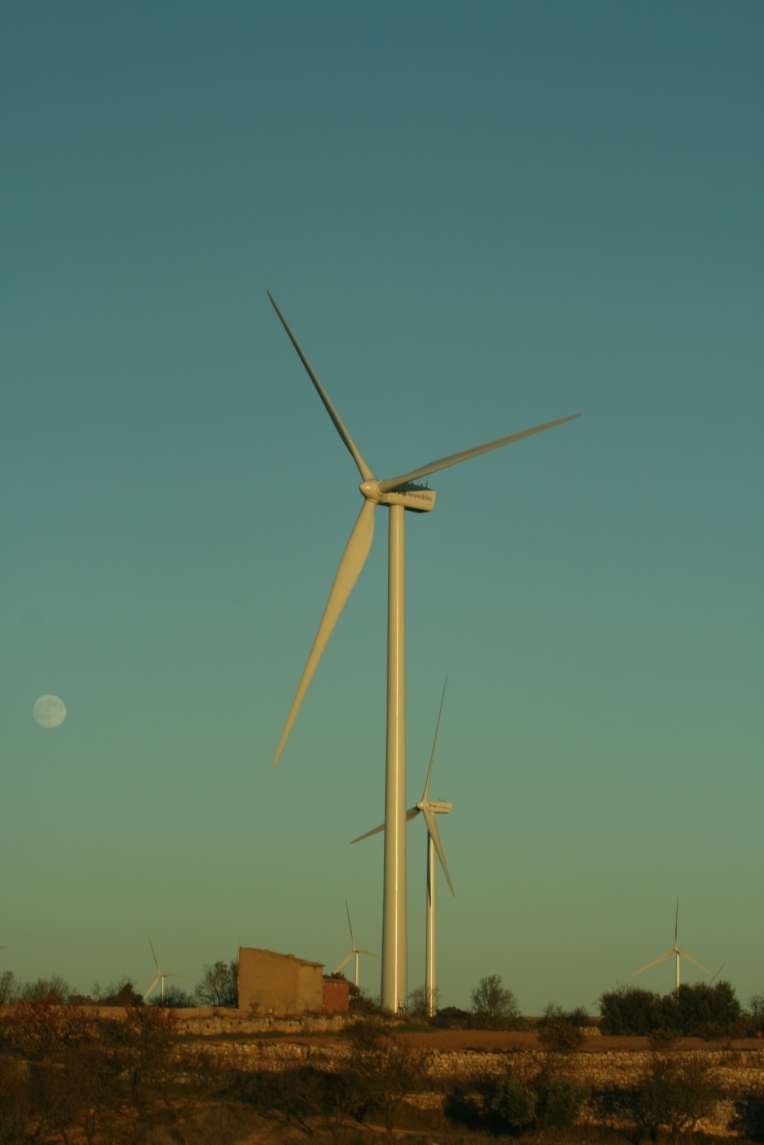Wind Fever: Green Energy and Its Fetishes
From the Series: Green Capitalism and Its Others
From the Series: Green Capitalism and Its Others

There is little doubt that the wind turbine has become a preferred icon of a new kind of capitalism: green and efficient, kind and daring, simple and smart. Contrast the smoke, coal, darkness, and strikes of the industrial age with a three-bladed turbine: white, sleek, silent, and elegant, the emblem of intelligent design atop a mantle of green grass, perpetual motion against a blue sky. This image is wind energy’s form, reality never quite achieving that perfection.
Certainly, we are captivated by the turbine’s promise of renewable energy, its capacity to make something useful (electricity) out of something (wind) that is renewable, free, and, otherwise, useless. The wind turbine exemplifies what Alf Hornborg (2001) calls the power of the machine, i.e., the fetishistic belief in the seemingly autonomous productive capacity of technology. As anthropologists, we need to defetishize this magic: noting the extent to which wind energy has extended capitalist logics of appropriation is a good place to start.

My book Power Struggles: Dignity, Value, and the Renewable Energy Frontier in Spain (Indiana University Press, 2018) analyzes the institutional arrangements, cultural mediations, and social relations of production through which the energy from wind is harnessed in Southern Catalonia. Situated in the northeast of the Iberian Peninsula, this sparsely populated, lagging rural territory has been at the center of energy development since the 1960s, hosting a wide range of energy infrastructure (from nuclear power plants and gas pipelines to hydroelectric dams and wind farms) and currently producing about two-thirds of the electricity consumed in Catalonia.
During my fieldwork I had numerous occasions to document how wind developers celebrated the virtues of wind energy. This is how Eudald, the owner of a small construction company that initiated the development of three wind farms in the region, put it to me:
As an engineer, I’ve always been fascinated: how you can make something useful out of something that you don’t need to pay anyone for. Because “Our Lord” . . . does not get paid for the fluid [wind] that you use for your electric turbine, and in contrast society reaps a great benefit from it: cheap energy. The fossil fuel cycle that we are part of needs to be closed off . . . and we have the solution in our hands.
The beginning of this quote is revealing. Although Eudald says that he speaks as an engineer, the truth of the matter is that he, first and foremost, is a businessman. As such, his prime goal is not finding a use for something that has none, but making profits, accumulating value. In other words, not making something from nothing, but for as little as possible. In this respect, Eudald was highly successful: in 2010 he sold his three wind farms for more than 20 million euros to a transnational energy company. And he quite literally got something for nothing, since he actually sold the wind farms before building them: all he sold were the bureaucratic permits, the agreements with the municipality, the leases with the landowners, and the rights of passage he obtained to build a twenty-kilometer electric line connecting the future wind farms to the electric grid. Asked about this extraordinary rate of return, he offered a concise rationale:
The business is lucrative, certainly. But it was lucrative because we did it ourselves, because I put in my own labor plus the labor of engineers who were already part of my company . . . You go see the peasant every two weeks and that’s it. The cost of the administrative permit is close to zero, and if it is zero then the yield on investment is infinite.
Put simply, his “infinite yield on investment” stems from the little money he had to invest in the negotiations with local institutions and landowners. Yet although he presents this negotiation as mere routine, the truth is that this was a years-long, highly contested process. Thus, for instance, a large number of landowners rejected the terms they were offered, forcing the wind company to request the government to initiate expropriation procedures. This antagonized many residents, who complained about their inability to negotiate and about the wind company “becoming the new landlord.” Humiliation was a widespread feeling, as this expropriated landowner expresses:
They have humiliated us, telling us that they were doing us a favor by giving us money for a land that had no value. Forgetting that our land is much more than just square meters, that it has been made through generations.
But conflict also penetrated the local social fabric, opening a rift between the “lucky ones” that received an annual rent (of around 6,000 euros) for hosting a turbine, and the “unlucky ones” who received a small one-off payment for hosting the associated infrastructure (ditches, roads, etc.). Personal and family interests trumped collective responses, eroding the local sense of self-worth and leaving many locals wondering whether the company was perhaps right—perhaps their land, and with it themselves, were worth less than the annual leases.
The power of wind developers such as Eudald should be defetishized: the value that they appropriate is not the simple product of their ingenuity or a mere technological cornucopia; rather, it depends on a broad field of value relations structuring the appropriation of nature and the organization of labor. Their profits hinge upon a series of characteristics that define the Spanish electricity system and the particular shape of wind energy development in the country: top-down planning, bureaucratic opacity, dependence on economic growth, and distant ownership by large companies and oligopolistic utilities.

These unequal social hierarchies work through uneven geographies: wind energy generation has been concentrated in peripheralized, impoverished lands such as Southern Catalonia, thus reproducing distributional inequities while imposing a power asymmetry at the heart of wind energy development. Eudald’s ability to access wind and profits was premised on an unequal balance of forces that found expression in the locals’ inability to negotiate, their incapacity to set the value of their land and assert their worth. The wind energy business in Spain needs people in places whose value can be diminished to as little as possible, places that can be morally and economically cheapened, that is to say, treated as what Vinay Gidwani (2012) calls waste.
Yet Southern Catalans have not stood passive. They have resisted wind farm installation and other forms of resource extraction and asserted their worth through a wide array of practices and discourses that populate my ethnography. Many readers will feel uncomfortable at the simple idea of critiquing wind energy, and this is understandable in the current political moment, especially in the United States, where bigoted politicians use their high office to ridicule renewables while denying climate change on an almost daily basis. However, it is important to underline that Southern Catalans do not oppose wind energy; rather, they criticize the particular shape that its development has taken in Spain, calling for a real, fairer energy transition. Indeed, their resistant praxis does not only reveal the contradictions and expose the inequities on which wind energy development has been based; it also contains social and political possibilities, offering insight into the construction of new, more democratic energy futures.
Gidwani, Vinay. 2012. “Waste/Value.” In The Wiley-Blackwell Companion to Economic Geography, edited by Trevor J. Barnes, Jamie Peck, and Eric Sheppard, 275–88. Malden, Mass.: Wiley-Blackwell.
Hornborg, Alf. 2001. The Power of the Machine: Global Inequalities of Economy, Technology and Environment. Lanham, Md.: AltaMira.